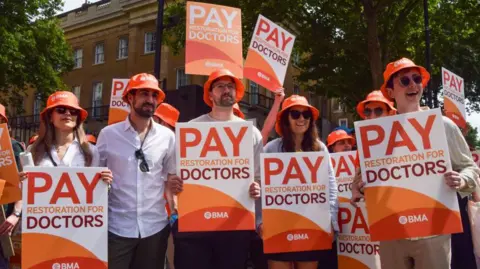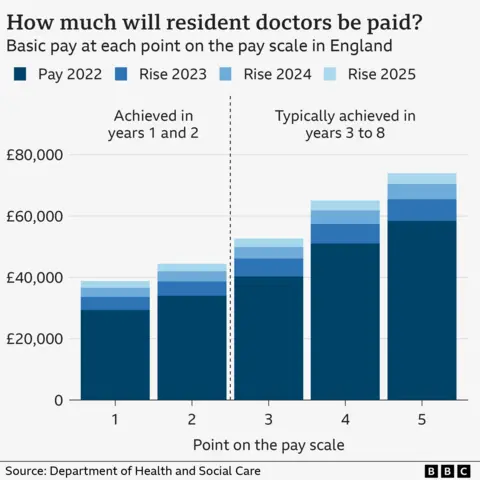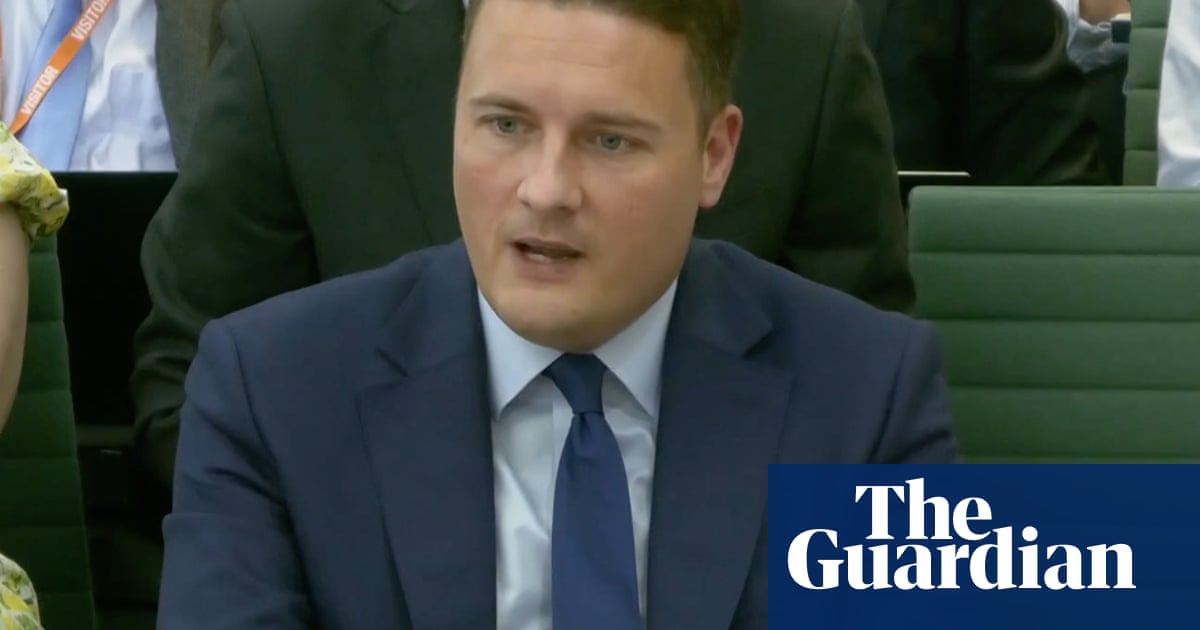
 Getty Images
Getty Images
Resident doctors in England are planning a walkout for five consecutive days from 25 July, over a pay dispute with the government.
They say they haven't had a "credible pay deal" for 2025-2026, but Health Secretary Wes Streeting argues the strike is "unreasonable" after substantial pay rises in recent years.
What are resident doctors' pay demands?
The British Medical Association (BMA), a trade union for doctors, says resident doctors' pay will be 20% lower in real terms than it was in 2008, even after an increase in August.
The BMA wants pay for the group - who used to be known as junior doctors - to be brought back in line with the level it was at 17 years ago, when they say their pay started to be eroded.
The claim is based on a measure of inflation called the Retail Price Index (RPI). This includes housing costs and shows higher price increases than some other inflation measures.
The BMA points out that many resident doctors have large student loans and that interest on these is calculated using RPI.
However, the government says RPI is outdated. Instead, it uses the Consumer Prices Index (CPI) to calculate inflation and pay increases. CPI looks at the cost of goods and services based on a basket of household items.
Using the CPI measure, the government says resident doctors' current pay is fair.
Analysis from the Nuffield Trust - a health think tank - suggests pay has fallen 5% since 2008 if CPI is used, compared with nearly 20% for RPI.
What pay rises have resident doctors had and what do they earn?
Since 2023, resident doctors have taken part in 11 separate strikes, arguing for fairer pay and working conditions.
During 2023-24, over two years, they received a 22% pay increase. From August this year, they will get an additional 5.4% pay rise.
Health Secretary Wes Streeting says resident doctors have received the largest pay rises of any public sector employees over the last three years.
The government says it won't be offering any further increases.
During their first foundation year after finishing their medical degree resident doctors in England earn a basic salary of £38,831, for an average of 48 hours worked per week. In the second year, this rises to £44,439.
Medics are often expected to work nightshifts, weekends and longer hours for extra payments.
After eight years as a resident doctor, salaries can progress to around £70,000.


What pay rises have people in other jobs had?
In May, the government announced pay rises for a number of public sector workers, including:
- 4% for other doctors, dentists, and teachers in England, as well as prison officers in England and Wales
- a 3.25% rise for civil servants
- a 3.6% rise for some NHS staff in England, including nurses and midwives
- a 4.5% rise for members of the UK armed forces, with 3.75% for senior military staff
However, the BMA argues that resident doctors may have built up more student debt than people working in other jobs.
A medical degree can take five or six years to complete - longer than most other degree courses.
Resident doctors also say they have little control on where and when they are asked to work. And it can be difficult to put down roots, because of the need to do placements in different parts of the country.
How will patients be affected by the resident doctors' strike?
The medics will stage a walkout in England from 07:00 on 25 July until 07:00 on 30 July.
NHS leaders have warned that patient care will be disrupted if the strike goes ahead.
On strike days, more senior doctors are likely to end up working in emergency and urgent care to replace striking resident doctors. As a result, many planned operations will have to be cancelled.
There were 507,000 appointments and operations cancelled and rescheduled because of strikes by doctors (some including consultants) between July 2023 and February 2024, according to government analysis.
Conservative leader Kemi Badenoch accused the prime minister of having "boasted that he solved the doctors' strike" only for them to take further action, adding that he'd been "weak" in dealing with the medics.
Scotland, Wales and Northern Ireland are not affected by these strikes.

 4 hours ago
2
4 hours ago
2










 English (US)
English (US)